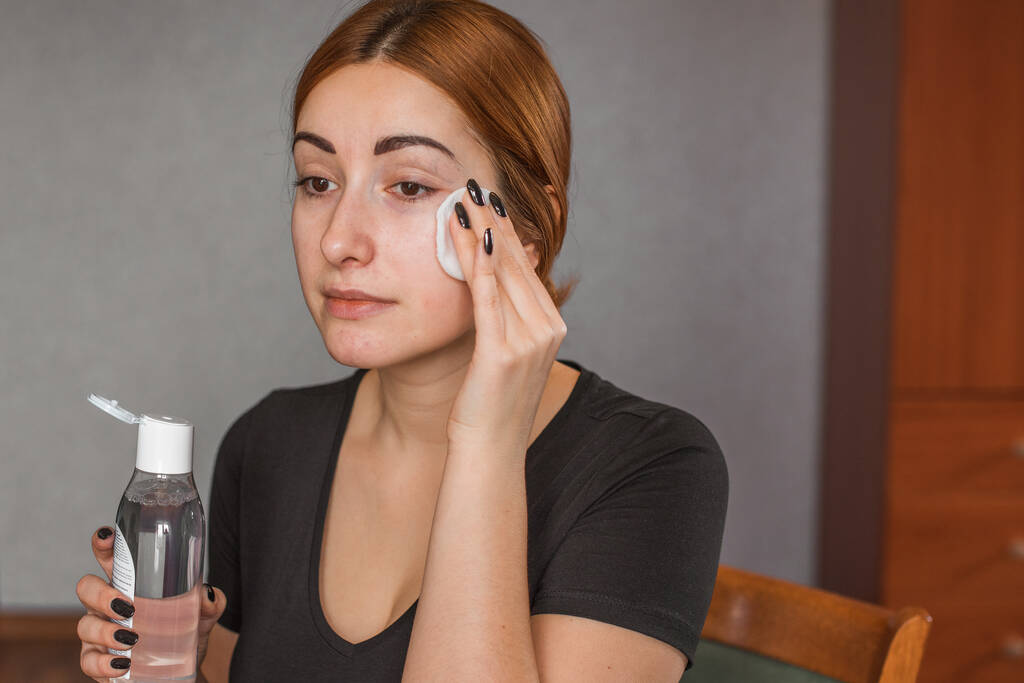Rosacea is a chronic skin condition that affects millions of people worldwide. It is characterized by redness, flushing, and small bumps on the face, especially on the cheeks, nose, forehead, and chin. It can also cause dryness, sensitivity, and irritation, making it difficult to manage. While there is no cure for rosacea, there are many skincare tips and products that can help reduce its symptoms and improve the overall appearance of the skin.
According to dermatologists, people with rosacea should follow a gentle skincare routine that includes mild cleansers, moisturizers, and sunscreens. They should avoid harsh chemicals, fragrances, and abrasive scrubs that can irritate the skin and trigger flare-ups. They should also be mindful of their diet, stress levels, and environmental factors that can affect their skin.
With the right skincare tips and products, people with rosacea can improve their skin's health and appearance. In this article, we will discuss six dermatologist-approved skincare tips and products for rosacea that can help soothe, hydrate, and protect the skin. We will also provide some insights into the causes and triggers of rosacea and how to manage it effectively. Whether you have mild or severe rosacea, these tips and products can help you achieve a clearer, brighter, and healthier-looking skin.
Skincare Routine for Rosacea

Individuals with rosacea have sensitive skin that requires a gentle skincare routine to avoid irritation. A basic routine includes cleansing, moisturizing, and sun protection.
Cleansing
When cleansing rosacea-prone skin, it is important to use a mild, fragrance-free cleanser. According to dermatologist Mark Dahl, MD, patients with rosacea often do not wash their skin enough. However, over-washing can lead to dryness and irritation. It is recommended to cleanse the face twice a day, very gently.
Moisturizing
Hydrated skin is less prone to irritation, so it is essential to moisturize daily. However, it is crucial to choose a gentle, oil-free cream with a high concentration of hyaluronic acid. Dr. Dennis Gross Hyaluronic Marine Oil-Free Moisture Cushion is a great option.
Sun Protection
Individuals with rosacea are more susceptible to sun damage, which can exacerbate symptoms. Therefore, it is essential to use a broad-spectrum sunscreen with an SPF of 30 or higher. A physical sunscreen with zinc oxide or titanium dioxide is less likely to cause irritation.
It is important to note that not all skin care products are suitable for individuals with rosacea. It is recommended to pare down the number of products used and focus on creating a regular daily routine with products that are tolerated by the skin.
Triggers to Avoid

People with rosacea often experience facial redness, flushing, and blushing. Certain triggers can cause flare-ups, making the condition worse. Here are some common triggers to avoid:
Food Triggers
Spicy foods, hot beverages, and alcohol are common food triggers for rosacea. These foods can cause blood vessels in the face to dilate, leading to redness and flushing. It's important to pay attention to which foods trigger your rosacea and avoid them if possible.
Environmental Triggers
Environmental triggers for rosacea can include sun exposure, wind, and extreme temperatures. It's important to protect your skin from the sun by wearing a hat and using sunscreen. Additionally, it's helpful to avoid extreme temperatures by staying indoors during hot or cold weather.
Lifestyle Triggers
Lifestyle factors such as stress, lack of sleep, and certain skincare products can trigger rosacea. Stress can cause blood vessels to dilate, leading to facial redness. Lack of sleep can also cause stress and trigger rosacea. It's important to manage stress and get enough sleep to avoid flare-ups. Additionally, certain skincare products such as exfoliants and astringents can irritate the skin and worsen rosacea. It's best to use gentle, non-irritating skincare products.
Overall, avoiding triggers is an important part of managing rosacea. By paying attention to food, environmental, and lifestyle triggers, people with rosacea can reduce the frequency and severity of flare-ups.
Treatment Options

While there may not be a cure for rosacea, there are several treatment options available to manage its symptoms. It is important to consult with a dermatologist to determine the best course of treatment for each individual case.
Prescription Medications
For more severe cases of rosacea, a dermatologist may prescribe medications such as metronidazole or ivermectin. These medications can help reduce inflammation and redness associated with rosacea. In some cases, oral antibiotics may also be prescribed to help control symptoms.
Topical Treatments
Topical treatments such as creams and gels can also be effective in managing rosacea symptoms. These treatments can help reduce redness and inflammation and may include ingredients such as azelaic acid or sulfur. It is important to use these treatments as directed and to avoid using products that may irritate the skin.
In-Office Procedures
In addition to prescription medications and topical treatments, in-office procedures may also be an option for managing rosacea. Intense pulsed light (IPL) therapy can help reduce redness and visible blood vessels associated with rosacea. For those with papulopustular rosacea, laser therapy may be recommended to reduce the appearance of bumps and pimples. In cases of phymatous rosacea, surgical procedures may be necessary to correct changes in the skin's texture.
Ingredients to Look For

When it comes to skincare for rosacea, it's important to look for ingredients that are gentle, anti-inflammatory, and antioxidant. These ingredients can help soothe and protect the skin, reducing redness and irritation. Here are some ingredients to look for:
Anti-Inflammatory Ingredients
Anti-inflammatory ingredients can help calm the skin and reduce redness and irritation. Some ingredients to look for include:
Azelaic acid
Bisabolol
Sodium lauryl sulfate-free cleansers
Azelaic acid is a natural anti-inflammatory that can help reduce redness and inflammation. Bisabolol is a gentle anti-inflammatory that can help soothe the skin. Sodium lauryl sulfate-free cleansers are gentle and non-irritating, making them a good choice for those with sensitive skin.
Antioxidant Ingredients
Antioxidants can help protect the skin from damage caused by free radicals, which can contribute to inflammation and redness. Some ingredients to look for include:
Hyaluronic acid
Ceramides
Vitamin C
Hyaluronic acid and ceramides are both natural moisturizing ingredients that can help hydrate the skin and protect its barrier function. Vitamin C is a powerful antioxidant that can help protect the skin from damage and reduce inflammation.
Gentle Ingredients
When it comes to skincare for rosacea, it's important to choose gentle ingredients that won't irritate the skin. Some ingredients to look for include:
Bisabolol
Aloe vera
Chamomile extract
Bisabolol is a gentle anti-inflammatory that can help soothe the skin. Aloe vera and chamomile extract are both natural ingredients that can help calm and soothe the skin, reducing redness and irritation.
Ingredients to Avoid

People with rosacea should be careful when selecting skincare products to avoid ingredients that can trigger irritation, stinging, and redness. Here are some ingredients to avoid:
Fragrance
Fragrances in skincare products can cause irritation and trigger rosacea flare-ups. Therefore, it is best to choose fragrance-free products whenever possible.
Alcohol
Alcohol is a common ingredient in many skincare products, including toners and astringents. However, it can be very drying and irritating to the skin, especially for people with rosacea. Therefore, it is best to avoid products that contain high amounts of alcohol.
Harsh Cleansing Agents
Harsh cleansing agents, such as sodium lauryl sulfate, can strip the skin of its natural oils and cause irritation. Therefore, it is best to choose gentle, non-foaming cleansers that are free of harsh cleansing agents.
Overall, people with rosacea should look for skincare products that are gentle, non-irritating, and fragrance-free. It is also important to patch test new products before using them on the entire face to avoid any potential reactions.
Managing Redness and Discoloration
One of the most common symptoms of rosacea is redness and discoloration on the face, which can be frustrating and difficult to manage. However, there are several steps that can be taken to help reduce redness and improve skin tone.
First, it is important to identify and avoid triggers that can cause flare-ups of redness and inflammation. Common triggers include spicy foods, alcohol, sun exposure, extreme temperatures, and stress. By avoiding these triggers, individuals with rosacea can help keep their skin calm and reduce redness.
Another important step in managing redness is to use gentle skincare products that are specifically formulated for sensitive skin. Look for cleansers that are free of harsh chemicals and fragrances, and opt for moisturizers that contain soothing ingredients like aloe vera and chamomile. It is also important to avoid scrubbing or rubbing the skin too vigorously, as this can cause further irritation and redness.
In addition to using gentle skincare products, individuals with rosacea may also benefit from using products that contain ingredients like niacinamide and green tea extract. These ingredients have been shown to help reduce redness and inflammation, and can help improve overall skin tone and texture.
Finally, it is important to protect the skin from further damage by using sunscreen with a high SPF. Sun exposure can worsen redness and inflammation, so it is important to apply sunscreen daily and reapply as needed throughout the day.
All in All
While there is no cure for rosacea, different treatment options are available to manage its symptoms. This may include prescription medications like metronidazole or ivermectin for severe cases or topical treatments containing ingredients like azelaic acid or sulfur. In-office procedures like IPL therapy or laser therapy may also be recommended in some cases. Additionally, individuals should be careful when selecting skincare products to avoid ingredients that can trigger irritation or redness such as fragrance or alcohol.
By following a gentle skincare routine, avoiding triggers that worsen symptoms, using suitable products with beneficial ingredients, and considering appropriate treatment options under the guidance of a dermatologist, individuals with rosacea can effectively manage their condition and achieve healthier-looking skin.
Also See
Best Sunscreen for Oily Skin: Top 15 Products to Keep Your Skin Protected and Sunburn-Free
Best Soap for Lupus Skin: Top 5 Picks for Sensitive Skin Care
Best Cleanser for Mature Skin: Top Picks for Anti-Aging and Hydration
The Ultimate Guide to Choosing the Best Dove Soap for Your Face
Best Skincare Fridge in 2023: Keep Your Beauty Products Fresh
Best Cleanser for Mature Skin: Top 15 Picks for Anti-Aging and Nourishment
The Benefits of Using Vaseline for Skin Rashes: A Comprehensive Guide
Best Treatment for Uneven Skin Tone: Top Solutions for a Flawless Complexion
The Ultimate Guide to Identifying and Relieving Allergic Reaction Rashes: A Comprehensive Analysis
